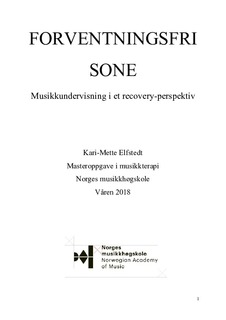Forventningsfri sone. Musikkundervisning i et recovery-perspektiv
Master thesis
Permanent lenke
http://hdl.handle.net/11250/2578510Utgivelsesdato
2018Metadata
Vis full innførselSamlinger
- Masteroppgaver [283]
Sammendrag
Abstract -
This master thesis is about music teaching in a recovery perspective. It is a qualitative study where I research how music teaching in a recovery perspective can improve quality of life for people with mental health problems. The participants are six persons associated with mental health care, who received tuition in piano and ukulele. Data collection methods of this study are participatory observation and semistructured interviews. Analysis of the data is phenomenologically-hermeneutically based and led to four categories: 1. Learning and mastery 2. A zone without expectations 3. Relational experiences 4. Music preferences and identity. These categories are discussed in light of quality of life and recovery. Quality of life forms a separate category with the following subcategories: 1. Recreational activity 2. Pleasure / Meaning 3. Self care 4. Social resource. In addition, this master thesis contains a chapter describing the activities and their methodology. Here I explain the choice of activities and the participants’ experience of them. This study is at the intersection of music therapy and music education and can thus be a contribution to both disciplines.
Keywords: Music therapy, music teaching, recovery, quality of life, mental health problems, piano teaching, a zone without expectations.
Beskrivelse
Norges musikkhøgskole. Masteroppgave. Musikkterapi
